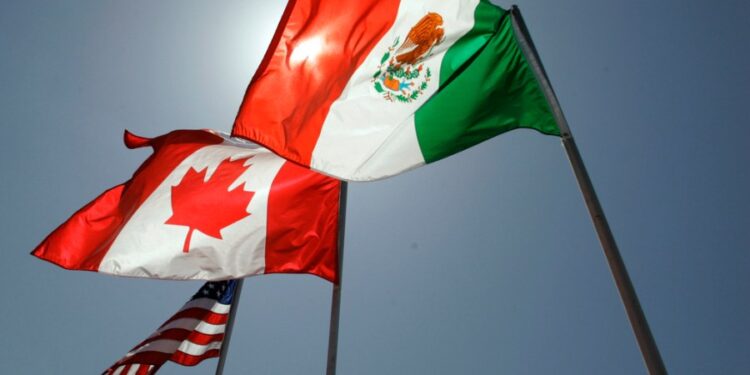
President Donald Trump started throwing trade grenades recently, announcing tariffs on Canada, Mexico and China. And he is imposing tariffs on steel and aluminum imports. But he’s just getting started with more tariffs on the way against products like automobile imports.
What can we expect from congressional Democrats in response to Trump going cowboy on trade? Not much, based on how they reacted to Trump’s trade policy in his first term.
Even though the Democrats controlled the House of Representatives for the last two years of the first Trump administration, for instance, they did not take any serious actions to reverse his steel and aluminum tariffs at that time.
Why? Because although congressional Democrats condemn Trump on many things, they agree with his trade policy. They have a soft spot for tariff man. It’s because Trump has always been more closely aligned with Democrats than Republicans on trade.
Consider the 2015-2016 Republican presidential primary, which was crowded with 17 candidates. But one lone candidate stood out for saying that the North American Free Trade Agreement ought to be ripped up. It was Trump. While other hopefuls hewed to Republican free-trade orthodoxy, Trump channeled progressive Democrats by attacking NAFTA.
Left-leaning Democrats criticized NAFTA for years after it took effect in 1994, arguing that it enriched greedy CEOs, prompted an exodus of U.S. corporations to Mexico, and hastened the decline of American manufacturing. Trump made those same arguments with gusto, maligning NAFTA as the “worst trade deal in history.”
Trump’s surprise election victory in 2016 offered an unusual prospect for progressive House Democrats on trade policy: Trump’s trade policy was more in sync with them than either former presidents Bill Clinton or Barack Obama’s. As Rep. Rosa DeLauro (D-Conn.) said, when praising Trump’s trade adviser Robert Lighthizer in 2019, “Bill Clinton called us thugs when we originally opposed NAFTA. Barack Obama said we didn’t know what we were talking about with the Trans-Pacific Partnership.”
This story of strange bedfellows played out just over five years ago in December 2019. House Democrats overwhelming voted for Trump’s rewrite of NAFTA, passing the U.S.-Mexico-Canada Agreement to pass by a massive majority of 385-41.
A total of 193 Democrats voted for it (over 80 percent of their caucus). That remarkable level of Democratic support for a trade agreement was unprecedented.
Even more stunning was on the day before, House Democrats had voted in near-lockstep to impeach Trump, 230-197. They indicted him on Wednesday and embraced him on Thursday.
When USMCA is up for review next year, Trump will demand changes to make it harder to export cars from Mexico to the U.S. Democrats will cheer him on.
Among the Republican presidential candidates in 2015-2016, Trump was the candidate most strongly opposed to the Trans-Pacific Partnership, a mega-trade deal covering the Asia-Pacific. He routinely attacked the deal.
This was another stark example of how Trump seemed to be running in the wrong presidential primary on trade. During the 2016 Democratic National Convention, delegates held signs that read “No TPP” and periodically they would break out in the chant of “Stop TPP, Stop TPP,” disrupting speeches. Trump could have led that chant.
To the delight of House Democrats, on his first full day in office in 2017, Trump pulled the plug on TPP. President Joe Biden created a new Asia-Pacific trade forum as an attempt to replace TPP. But Trump has said he will kill it. Even though it was a Biden initiative, Democrats are not coming to the rescue of it.
So on trade policy, Democrats will be happy to go along with Trump 2.0. Some moderate, free-trade House Democrats might lead symbolic charges against Trump. But such Democrats are nearly extinct, with their caucus now dominated by progressives who are close to organized labor. And organized labor is a huge fan of Trump trade policy.
In addition to agreeing with Trump’s economic nationalism, Democrats are warring with Republicans to appeal to the group that most strongly supports Trump’s protectionist trade policy: working-class voters. Democrats will be loath to attack Trump’s trade policy, because that will not appeal to those voters — a group that the Democrats desperately want back.
Working-class voters like that Trump will fight foreign trading partners and take them to task for their bad deeds, whether real or perceived. Of course, the increased tariffs will bite their pocketbooks. But as “What’s The Matter with Kansas” taught us years ago, voters frequently ignore voting in their own economic interests. Instead, passion guides their hand as they fill in the oval circles on their ballot form.
So as Trump’s reign of tariffs begins, don’t be expecting Democrats to mount much of a fight. It’s simple — on trade, Trump is a Democrat.
David Boling works at Eurasia Group, a political risk consultancy, and previously served as a trade negotiator in the Obama, Trump, and Biden administrations.





